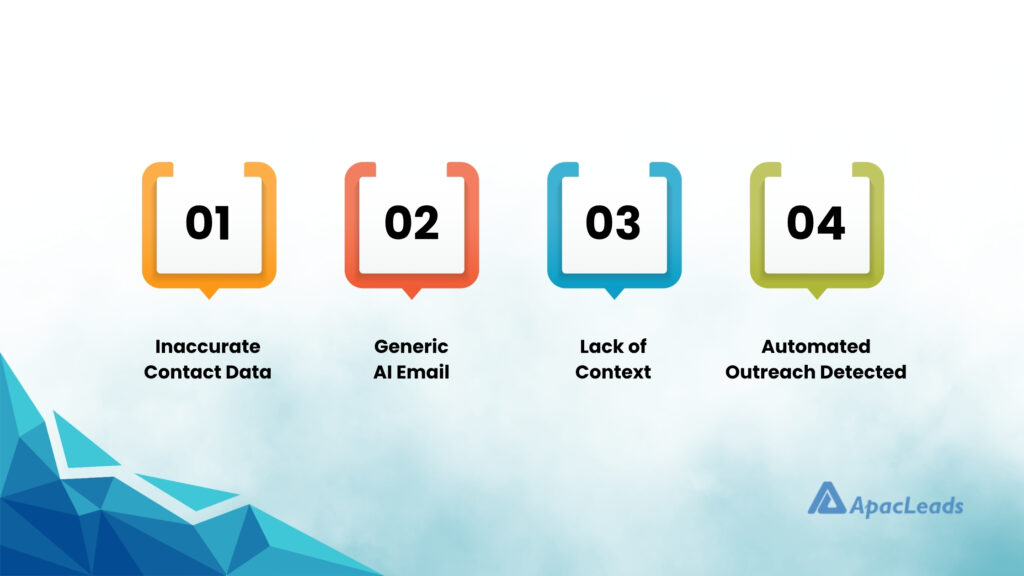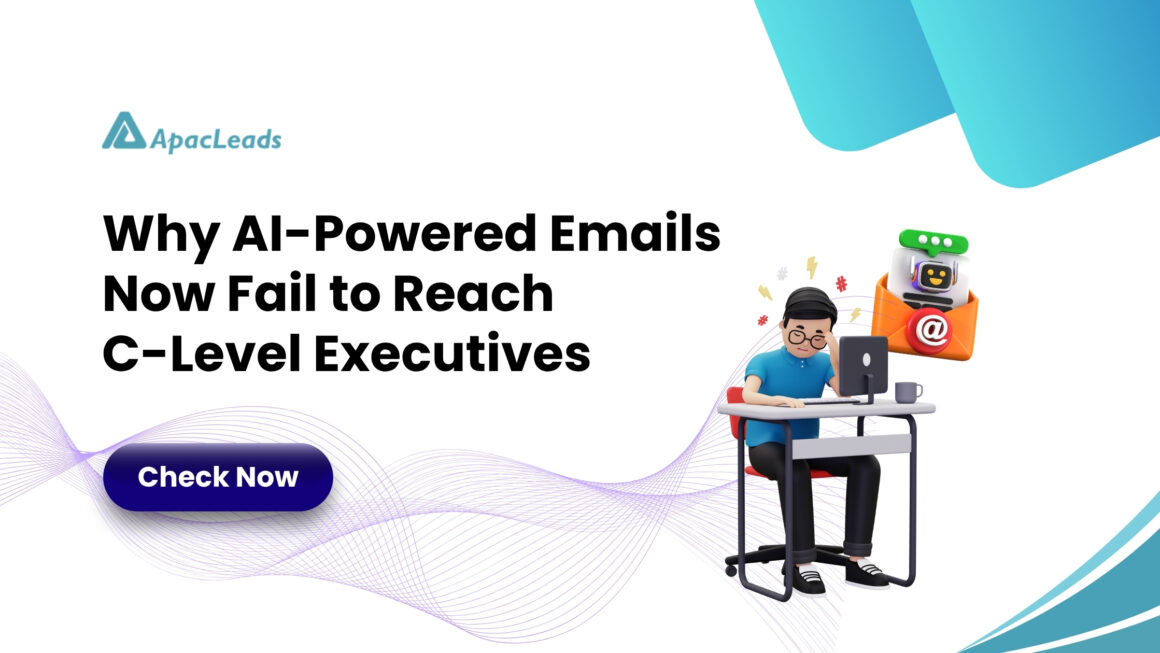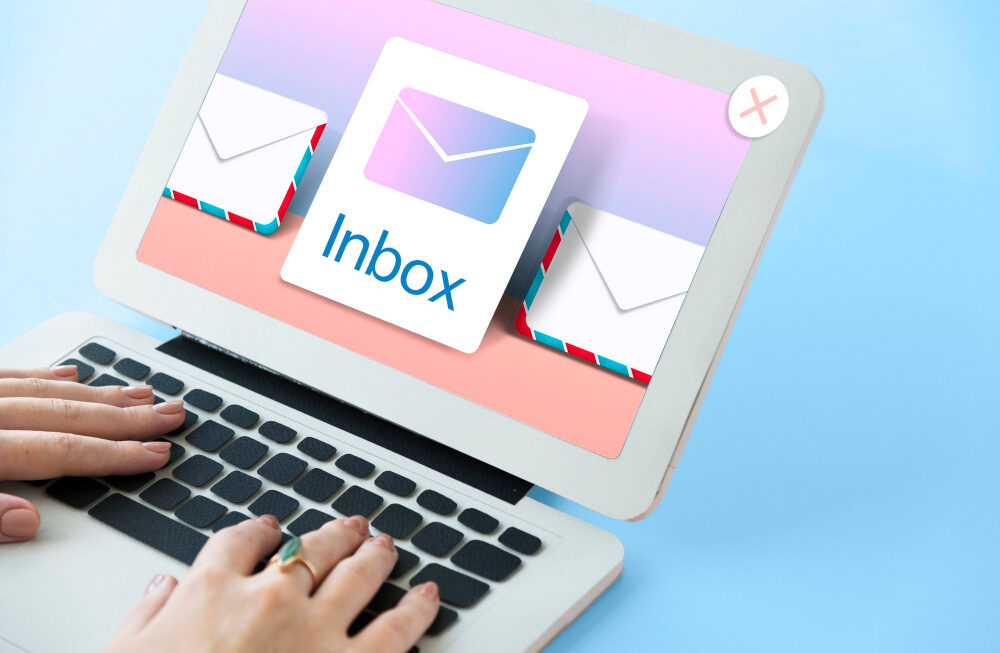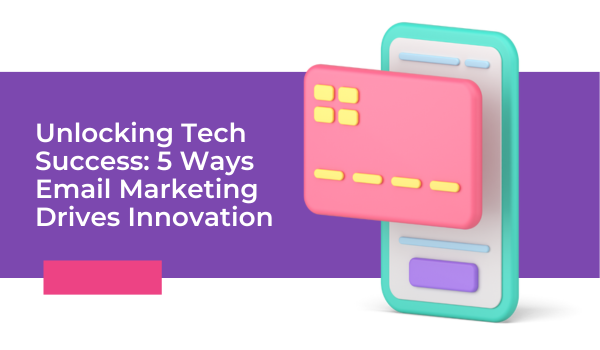Remember when AI promised to revolutionize B2B email marketing? Tools like ChatGPT and other large language models were expected to craft ultra-personalized messages that would land directly in the inboxes of CEOs, CTOs, and CMOs—cutting through noise and saving time. But here’s the reality: most AI-powered B2B emails aren’t reaching C-level executives at all.
It’s not the AI’s fault. The real problem is the outdated, inaccurate, and unverified data driving these campaigns. When you’re reaching out to decision-makers who receive hundreds of emails daily, even the smartest email fails if it’s sent to the wrong person—or arrives with irrelevant context.
In this guide, we’ll break down exactly why your AI-driven email strategy is falling short with the C-suite and, more importantly, how to fix it using verified contact data, smarter segmentation, and context-driven personalization.
The Rise of AI in B2B Email Marketing
AI tools transformed how we approach email marketing almost overnight. Suddenly, you could generate personalized subject lines, craft compelling body copy, and segment audiences at scale—all with a few prompts.
Companies started using AI email automation to:
- Personalize messages based on job titles and company information
- Segment audiences by industry, company size, and role
- Automate follow-up sequences that adapt to recipient behavior
- Scale outreach efforts to reach thousands of prospects simultaneously
The promise was clear: reach decision-makers faster, with messages that felt human-written but could be produced at machine speed.
But here’s where things went sideways.
Why C-Level Executives Are Ignoring AI-Generated Emails
C-level executives operate in a different world than most professionals. They’re bombarded with pitches, proposals, and “urgent” requests daily. Their assistants filter aggressively, and they’ve developed a sixth sense for detecting generic outreach.
When AI-powered emails started flooding executive inboxes, several problems emerged:
Overused templates created generic messaging. Even with personalization, many AI-generated emails followed similar patterns. Executives began recognizing these formulaic approaches instantly.
Lack of contextual understanding. AI might know a CEO’s name and company, but it doesn’t understand their current challenges, recent company changes, or immediate priorities.
Spam filters caught overly automated content. Email providers became better at detecting AI-generated content, especially when it lacked genuine personalization.
Short attention spans met irrelevant content. When an email mentions outdated job titles or irrelevant company information, busy executives delete it immediately.
Why Are AI-Powered B2B Emails Important for C-Level Executive Outreach?
Despite these challenges, AI-powered B2B emails remain crucial for reaching decision-makers. Here’s why:
C-level executives are incredibly busy. They need information presented concisely and relevantly. AI can analyze vast amounts of data about their companies, industries, and recent activities to craft targeted messages that respect their time.
AI also enables you to scale personalized outreach. While you can’t manually research every CEO you want to reach, AI can process thousands of data points to create meaningful connections at scale.
The key is using AI correctly—with accurate, up-to-date information that reflects the executive’s current reality.
Key Reasons AI-Powered B2B Emails Fail to Engage C-Level Executives

Let’s dig into the specific reasons why your AI email campaigns might be missing the mark:
Inaccurate Contact Data Impacts Deliverability
Outdated contact information leads to bounced emails and damaged sender reputation. When your database lists someone as “VP of Operations” but they became CEO six months ago, your personalization immediately signals you’re not paying attention.
Homogeneous AI Messaging Reduces Effectiveness
Generic messaging despite AI sophistication. Many companies use the same AI tools with similar prompts, creating emails that sound remarkably similar. Executives notice these patterns.
Lack of Context Undermines Relevance
Poor timing and context. AI might craft a beautiful email about digital transformation, but if the company just announced layoffs or a major acquisition, that message feels tone-deaf.
Advanced Spam Filters Detect Automated Outreach
Spam filtering has evolved to catch AI-generated content. Email providers use their own AI systems to detect overly automated outreach, especially when it lacks genuine personalization markers.
The Importance of Data Accuracy in AI-Powered B2B Email Marketing
Here’s the uncomfortable truth: AI is only as good as the data you feed it.
When you’re targeting C-level executives, data accuracy becomes even more critical. These decision-makers change roles frequently, companies undergo restructuring, and new executives join organizations regularly.
Consider this scenario: Your AI crafts a brilliant email about cost optimization strategies for a CFO. But that person left the company three months ago, and the new CFO is focused on growth initiatives, not cost-cutting. Your perfectly written email not only misses the target—it demonstrates you’re not current with their organization.
Fresh, verified data ensures your AI-powered personalization actually resonates with recipients. It’s the difference between an email that feels researched and one that feels like spam.
The Root Cause – Outdated and Inaccurate Data
Most B2B email databases decay at alarming rates. Studies show that contact information becomes outdated at approximately 22.5% annually. For C-level executives, this rate is even higher due to frequent role changes and company movements.
When you combine this data decay with AI personalization, you get:
Bounced emails that damage your sender reputation and reduce overall deliverability. Each bounce signals to email providers that your list quality is poor.
Spam complaints from recipients who receive irrelevant messages. When executives get emails addressing them by wrong titles or discussing irrelevant topics, they’re more likely to mark them as spam.
Low open rates because subject lines reference outdated information. An email mentioning a company’s “recent Series A funding” from two years ago immediately signals poor research.
Poor timing that misses current priorities. AI might reference a company’s expansion plans that were shelved due to market conditions, making your outreach feel out of touch.
The inability to reflect recent executive changes or company updates undermines even the most sophisticated AI-generated content.
The Limitations of AI without Fresh, Verified Data
Large language models excel at processing and synthesizing information, but they can’t verify data accuracy or update information in real-time. LLMs work with the data you provide—if that data is stale, outdated, or incorrect, even the smartest AI will produce irrelevant content.
Think of it this way: You wouldn’t expect a brilliant writer to create compelling content without accurate research. Similarly, AI needs fresh, verified data to create meaningful personalization.
Here’s a real example from our observations:
A SaaS company spent weeks crafting AI-powered email sequences targeting CTOs at fast-growing tech companies. The AI generated compelling content about scaling infrastructure and managing technical teams. However, their contact database hadn’t been updated in eight months. Over time, this led to serious deliverability issues:
- 40% of their “CTOs” had changed roles
- Many target companies had undergone significant restructuring
After switching to our verified, regularly updated contact database:
- Open rates improved by 180%
- They generated 3x more qualified responses from actual decision-makers
The integration between your CRM and real-time data feeds becomes crucial. AI systems need access to current information about job changes, company updates, and recent activities to create truly personalized outreach.
How to Fix the Problem and Reach C-Suite Decision Makers
Ready to improve your AI-powered email success with C-level executives? Here’s your action plan:
Invest in verified B2B email data providers. The foundation of successful AI-powered campaigns starts with clean, accurate contact data. Specialized C-level executives lists from reputable providers offer verified email addresses, current job titles, and real-time updates on executive movements. Quality providers maintain databases with multiple verification layers and track executive changes across industries daily.
Align email campaigns with updated firmographic and technographic data. Ensure your AI has access to current information about company size, recent funding, technology stack, and organizational changes. This context enables more relevant personalization.
Use AI for behavioral insights and real-time signals. Monitor executives’ LinkedIn activity, company announcements, and industry involvement. AI can analyze these signals to determine optimal timing and messaging approaches.
Humanize your messaging and limit over-automation. While AI can draft initial content, add human touches that demonstrate genuine research and understanding. Reference specific, recent developments that automated systems might miss.
Segment based on executive needs and priorities. A CFO’s concerns differ significantly from a CMO’s or CTO’s priorities. Use AI to create role-specific messaging that addresses distinct challenges and opportunities. The most effective approach involves accessing comprehensive C-level executives lists that include detailed role information, company size, and industry-specific data points.
Implement intent-based targeting. Focus on executives whose companies are actively seeking solutions in your category. AI can identify buying signals and prioritize outreach accordingly.
Final Thoughts
AI isn’t the enemy of effective B2B email marketing—bad data is.
The most sophisticated AI tools can’t overcome fundamental data quality issues. When you’re targeting C-level executives who receive hundreds of emails daily, accuracy and relevance become even more critical.
The winning combination is verified, up-to-date executive contact data feeding intelligent AI systems. This approach ensures your personalization feels genuine, your timing is appropriate, and your messaging resonates with busy decision-makers.
From our experience helping companies reach C-suite executives across APAC markets, we’ve seen that campaigns using Verified C-level Executives lists consistently outperform those using outdated databases by 200-300%. The investment in quality executive contact data pays for itself through improved deliverability, higher engagement rates, and more qualified leads from decision-makers.
Remember: C-level executives will always prioritize relevance over automation. Give your AI the fresh, accurate data it needs to create that relevance, and you’ll start seeing inbox visibility improve dramatically.
Ready to Transform Your C-Level Outreach?
Stop wasting time on outdated contact lists that sabotage your AI-powered campaigns. Access our comprehensive C-level executives list with verified contact information for decision-makers across industries and regions.
What makes our C-level executives list different?
- Real-time updates on executive job changes and movements
- Verified email addresses with 95%+ deliverability guarantee
- Detailed firmographic and technographic data for better targeting
- Intent signals and buying behavior insights
- Industry-specific segmentation across APAC markets
- Direct access to CEO Email List, CTO Email List, CMO Email List, CFO Email List, and other C-suite roles
Explore Our Complete C-Level Executives List
Transform your AI email campaigns with verified executive contacts that actually reach decision-makers.
Frequently Asked Questions (FAQ)
Because they rely on outdated contact data, resulting in irrelevant content and poor deliverability. When AI personalizes emails using stale information, executives immediately recognize the lack of current research.
AI-generated emails sound smart but fail without clean, verified targeting data. The sophistication of the writing can’t overcome fundamental accuracy problems with contact information and company details.
Use updated, intent-based C-level executives list and personalize emails based on real-time behavior. Focus on executives whose companies are actively seeking solutions and reference current, relevant information. Quality executive contact databases provide the foundation for successful AI-powered personalization.
Outdated data leads to wrong job titles, bounced emails, and irrelevant messaging, reducing the effectiveness of even the most advanced AI-generated emails. This creates a cascade effect that damages sender reputation and overall campaign performance.
Job roles, company size, industry type, decision-making authority, and recent activity or buying signals are critical for accurate personalization. Additionally, monitoring company announcements, funding rounds, and organizational changes ensures your messaging stays relevant and timely.



